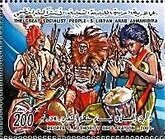Stamp: National Sovereignty (Libya 2003)
National Sovereignty (Libya 2003)
02 March (Libya ) within release The 26th Anniversary of Proclamation of National Sovereignty goes into circulation Stamp National Sovereignty face value 200 Libyan dirham
| Stamp National Sovereignty in catalogues | |
|---|---|
| Michel: | Mi: LY 2858I |
Stamp is square format.
Also in the issue The 26th Anniversary of Proclamation of National Sovereignty:
- Souvenir Sheet - National Sovereignty face value 300;
- Mini Sheet - National Sovereignty face value 6*200;
- Mini Sheet - National Sovereignty face value 6*200;
- Stamp - National Sovereignty face value 200;
- Stamp - National Sovereignty face value 200;
- Stamp - National Sovereignty face value 200;
- Stamp - National Sovereignty face value 200;
- Stamp - National Sovereignty face value 200;
- Stamp - National Sovereignty face value 200;
- Stamp - National Sovereignty face value 200;
- Souvenir Sheet - National Sovereignty face value 300;
- Stamp - National Sovereignty face value 300;
- Stamp - National Sovereignty face value 200;
- Stamp - National Sovereignty face value 200;
- Stamp - National Sovereignty face value 300;
- Stamp - National Sovereignty face value 200;
- Stamp - National Sovereignty face value 200;
Stamp National Sovereignty it reflects the thematic directions:
Folklore is the body of expressive culture shared by a particular group of people; it encompasses the traditions common to that culture, subculture or group. These include oral traditions such as tales, proverbs and jokes. They include material culture, ranging from traditional building styles to handmade toys common to the group. Folklore also includes customary lore, the forms and rituals of celebrations such as Christmas and weddings, folk dances and initiation rites. Each one of these, either singly or in combination, is considered a folklore artifact. Just as essential as the form, folklore also encompasses the transmission of these artifacts from one region to another or from one generation to the next. For folklore is not taught in a formal school curriculum or studied in the fine arts. Instead these traditions are passed along informally from one individual to another either through verbal instruction or demonstration. The academic study of folklore is called folkloristics.
A musical instrument is a device created or adapted to make musical sounds. In principle, any object that produces sound can be considered a musical instrument—it is through purpose that the object becomes a musical instrument. A person who plays a musical instrument is known as an instrumentalist. The history of musical instruments dates to the beginnings of human culture. Early musical instruments may have been used for rituals, such as a horn to signal success on the hunt, or a drum in a religious ceremony. Cultures eventually developed composition and performance of melodies for entertainment. Musical instruments evolved in step with changing applications and technologies.
A musician is an artist who composes, conducts, or performs music. According to the United States Employment Service, "musician" is a general term used to designate a person who follows music as a profession. Musicians include songwriters, who write both music and lyrics for songs; conductors, who direct a musical performance; and performers, who perform for an audience. A music performer is generally either a singer, who provides vocals, or an instrumentalist, who plays a musical instrument. Musicians may perform on their own or as part of a group, band or orchestra. Musicians can specialize in a musical genre, though many play a variety of different styles, depending on the cultures and backgrounds involved. A musician who records and releases music can be known as a recording artist.


